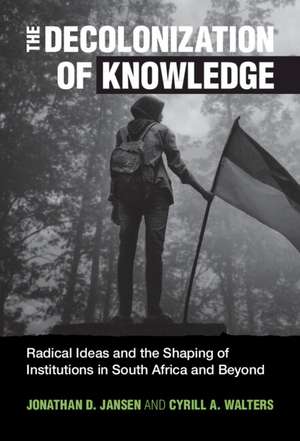The Decolonization of Knowledge: Radical Ideas and the Shaping of Institutions in South Africa and Beyond
Autor Jonathan D. Jansen, Cyrill A. Waltersen Limba Engleză Paperback – 29 iun 2022
| Toate formatele și edițiile | Preț | Express |
|---|---|---|
| Paperback (1) | 177.20 lei 6-8 săpt. | |
| Cambridge University Press – 29 iun 2022 | 177.20 lei 6-8 săpt. | |
| Hardback (1) | 527.39 lei 6-8 săpt. | |
| Cambridge University Press – 29 iun 2022 | 527.39 lei 6-8 săpt. |
Preț: 177.20 lei
Nou
Puncte Express: 266
Preț estimativ în valută:
33.91€ • 35.36$ • 28.18£
33.91€ • 35.36$ • 28.18£
Carte tipărită la comandă
Livrare economică 20 martie-03 aprilie
Preluare comenzi: 021 569.72.76
Specificații
ISBN-13: 9781009077934
ISBN-10: 1009077937
Pagini: 272
Dimensiuni: 151 x 230 x 13 mm
Greutate: 0.37 kg
Ediția:Nouă
Editura: Cambridge University Press
Colecția Cambridge University Press
Locul publicării:Cambridge, United Kingdom
ISBN-10: 1009077937
Pagini: 272
Dimensiuni: 151 x 230 x 13 mm
Greutate: 0.37 kg
Ediția:Nouă
Editura: Cambridge University Press
Colecția Cambridge University Press
Locul publicării:Cambridge, United Kingdom
Cuprins
Acknowledgements; 1. Introduction: the decolonization of knowledge: radical ideas and the settled curriculum; 2. Institutional posturing: the coming of decolonization and the scramble to respond; 3. On the institutionalization of knowledge; 4. The contending meanings of decolonization –and the implications for radical curriculum change; 5. Regulating radical ideas: the role of regulatory agencies; 6. The uptake of decolonization: the case of the humanities and social sciences; 7. The uptake of decolonization: the case of the sciences and engineering; 8. How does a radical curriculum idea travel through institutional life?: new insights into the politics of knowledge; References; Index
Recenzii
'This is an exceptional contribution to our understanding of what actually happens to challenging curriculum ideas in higher education. Politically wise and clearly written, this volume deserves a wide audience among all of those who care about creating a more socially and culturally responsive education.' Michael W. Apple, University of Wisconsin
'The movement to 'decolonize' South African universities has produced far more heat than light. In this sober, brave, deeply empathetic book, Jansen and Walters look beyond the slogans and posturing to illuminate not only the failings but also the achievements and possibilities of the struggle for radical educational change.' James T. Campbell, Stanford University
'This theoretically contextualized investigation situates the problem of doing radical curriculum transformation within the dynamics of institutional intransigence, biographies of academic innovators, and the struggle for epistemic justice. It has profound intellectual and practical significance for academics and activists in South Africa and beyond.' Joyce King, Georgia State University
'This book sheds new light on how we understand reform, the ideas that inform it, the path those ideas follow, and implementation. The notion of an institutional curriculum could allow real transformation. This is a book for institutional leaders and the broader community to learn from and inform their reform projects.' Teboho Moja, New York University
'Easy to understand and entertaining, this book informs, theorises, and unpacks some of the knottiest issues in higher education. Its complex arguments about decolonisation and curriculum revision will reach and benefit a wide readership in (South) Africa and beyond, including academics and non-experts. A refreshing achievement!' Chika C. Mba, University of Ghana
'The movement to 'decolonize' South African universities has produced far more heat than light. In this sober, brave, deeply empathetic book, Jansen and Walters look beyond the slogans and posturing to illuminate not only the failings but also the achievements and possibilities of the struggle for radical educational change.' James T. Campbell, Stanford University
'This theoretically contextualized investigation situates the problem of doing radical curriculum transformation within the dynamics of institutional intransigence, biographies of academic innovators, and the struggle for epistemic justice. It has profound intellectual and practical significance for academics and activists in South Africa and beyond.' Joyce King, Georgia State University
'This book sheds new light on how we understand reform, the ideas that inform it, the path those ideas follow, and implementation. The notion of an institutional curriculum could allow real transformation. This is a book for institutional leaders and the broader community to learn from and inform their reform projects.' Teboho Moja, New York University
'Easy to understand and entertaining, this book informs, theorises, and unpacks some of the knottiest issues in higher education. Its complex arguments about decolonisation and curriculum revision will reach and benefit a wide readership in (South) Africa and beyond, including academics and non-experts. A refreshing achievement!' Chika C. Mba, University of Ghana
Notă biografică
Descriere
A timely and innovative study on how the decolonization movement is transforming universities, curricula and campuses.
